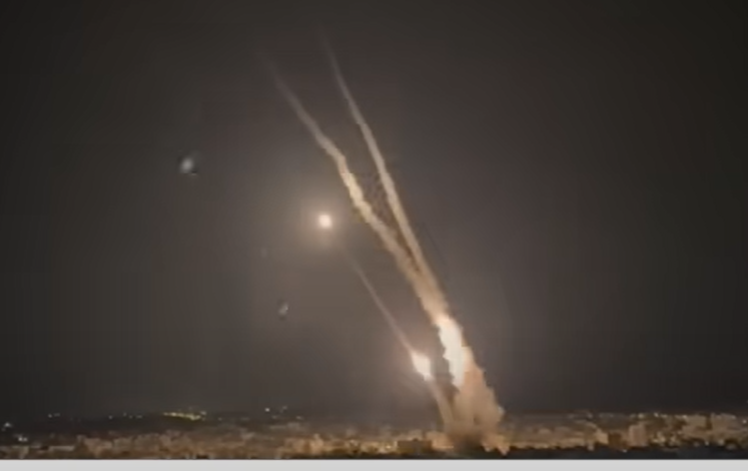The world woke up to a shocking and unprecedented escalation in the Israeli-Palestinian conflict as Hamas fighters launched a massive invasion across Israel’s southern border with Gaza. The invasion saw the storming of Israeli towns, resulting in casualties among both Israeli soldiers and civilians. Thousands of rockets were fired into Israeli territory, and the toll of at least 100 Israeli lives lost in a single day marks a tragic milestone in the history of the Israeli-Palestinian conflict. In the midst of this turmoil, Israel’s retaliatory airstrikes have claimed nearly 200 Palestinian lives, with the numbers expected to rise further. The scale of this conflict is unlike anything witnessed in recent memory, and its consequences for the region and the broader Middle East remain uncertain.

The Unprecedented Attack
The invasion by Hamas fighters represents a major departure from the historical patterns of conflict in the region. Even the Second Intifada, a period of intense violence in the early 2000s, did not witness such a mass incursion into Israeli territory. As this situation unfolds, it raises a crucial question: What led to this unprecedented escalation in the Israeli-Palestinian conflict?
The recent escalation in the Israeli-Palestinian conflict has sent shockwaves throughout the world, marking an unprecedented and deeply troubling turn of events. The attack launched by Hamas fighters, which saw them crossing Israel’s southern border with Gaza, represents a departure from the familiar patterns of conflict that have defined the region for decades.
Storming Israeli Towns
One of the most striking aspects of this unprecedented attack is the storming of Israeli towns by Hamas fighters. These incursions into Israeli territory have resulted in casualties among both Israeli soldiers and civilians. The scale of the attack and the brazenness with which it was executed have left the international community stunned.
Thousands of Rockets Fired
Another alarming dimension of the attack is the sheer volume of rockets fired into Israeli territory. Hamas militants launched a barrage of rockets, creating a state of constant fear and danger for Israeli civilians. The attacks have caused widespread destruction and loss of life, with at least 100 Israelis reported dead, marking a tragic milestone in the history of the Israeli-Palestinian conflict.
Retaliatory Airstrikes
In response to the Hamas attack, Israel launched retaliatory airstrikes, further escalating the conflict. These airstrikes have claimed the lives of nearly 200 Palestinians, and the numbers are expected to rise. The situation on the ground remains tense and volatile, with no clear path to de-escalation in sight.
Uncertain Future
The magnitude and intensity of this attack have left many questions unanswered. The international community grapples with the uncertainty of what the future holds for the region and the broader Middle East. The consequences of this escalation are far-reaching and difficult to predict.
In the midst of this turmoil, it is imperative to examine the underlying factors that contributed to this unprecedented attack. Understanding the root causes and motivations behind this conflict is essential for charting a path toward peace and stability in a region that has been plagued by violence for far too long.

Background Conditions
To comprehend the unprecedented attack launched by Hamas on Israel, it is crucial to examine the background conditions that have contributed to this alarming escalation. While the specific reasons for this attack may not be entirely clear, several underlying factors have made the situation particularly combustible.
Ongoing Occupation
One of the enduring issues at the heart of the Israeli-Palestinian conflict is the ongoing Israeli occupation of Palestinian territories. Israel’s physical presence in the West Bank and its economically devastating blockade of the Gaza Strip have long been sources of tension and frustration for Palestinians. The occupation has fueled resentment and resistance, creating a volatile environment.
Recent Surges of Conflict
In the lead-up to the attack, there were notable surges of conflict in Jerusalem and the West Bank. These tensions added to the overall volatility of the region. Clashes in East Jerusalem, particularly around the Temple Mount, a holy site for both Jews and Muslims, exacerbated existing grievances and inflamed passions.
Far-Right Israeli Government
The composition of the Israeli government has also played a role in the current crisis. Israel’s government is currently dominated by far-right factions that oppose a peace agreement with the Palestinians. This shift in Israeli politics has led to policies that have raised tensions and further eroded prospects for a peaceful resolution to the conflict.
Normalization Negotiations
Recent negotiations between Israel and Saudi Arabia about normalizing relations have introduced another layer of complexity to the situation. While these negotiations are seen as a major diplomatic breakthrough, they have also raised concerns among Palestinians. Many view this normalization as a sign that the Arab world may be abandoning its support for Palestinian rights, deepening their sense of isolation.
Escalating Settler Violence
Israeli settler violence in the West Bank has added fuel to the fire. The Israeli government’s perceived tolerance of settler violence, including attacks on Palestinian civilians, has fueled Palestinian anger and frustration. The situation in places like the West Bank town of Huwara, where settlers have gone on violent rampages, has further heightened tensions.
Strategic Calculations by Hamas
Hamas, the militant faction that governs the Gaza Strip, has its own strategic calculations. To maintain its position as a powerful player in Palestinian politics, Hamas seeks to channel Palestinian anger at Israel and the occupation. The angrier Palestinians are, the more Hamas can position itself as the authentic voice of resistance.
Potential Geopolitical Factors
Geopolitical considerations cannot be ignored. Israel’s ongoing efforts to normalize relations with Arab countries, including the Abraham Accords during the Trump administration, have been seen by some Palestinians as abandonment by the Arab world. Hamas may see its actions as a way to disrupt these normalization efforts and maintain the focus on Palestinian issues.
The Path Forward
While these background conditions offer some insights into the complex factors at play, the situation remains highly fluid and uncertain. The attack launched by Hamas has upended the status quo, and the consequences are difficult to predict. The suffering, however, is palpable, with ordinary Israelis and Palestinians paying a heavy price for the actions of extremist leaders on both sides.
As the conflict continues to unfold, it is essential to consider the long-term implications of these background conditions and the urgent need for a lasting and just resolution to the Israeli-Palestinian conflict. Without a radical political change and a mutually agreeable solution that addresses the root causes of violence, stability in the region remains elusive, and the cycle of violence may persist.
Ongoing Occupation
One of the enduring issues in the Israeli-Palestinian conflict is the Israeli occupation of Palestinian territories. Despite Israel’s withdrawal from the Gaza Strip in 2005, the imposition of a strict blockade on Gaza has continued. This blockade, which tightly regulates the flow of goods and people, has deepened the Palestinian sense of oppression.
Recent Surges of Conflict
Recent events in Jerusalem and the West Bank have added to the volatile mix. These events include clashes around the Temple Mount and heightened tensions, which have created an environment conducive to conflict. Palestinian resentment has grown as a result.
Far-Right Israeli Government
The composition of Israel’s government plays a crucial role in shaping the conflict. The current Israeli government is characterized by a far-right ideology and a reluctance to pursue peace agreements with the Palestinians. This government’s actions, including its de facto annexation of the West Bank and the failure to address settler violence, have exacerbated tensions.
Israeli-Saudi Negotiations
Israel’s negotiations to normalize relations with Saudi Arabia, following the Abraham Accords with other Arab countries, have raised concerns among Palestinians. Many Palestinians perceive these normalization efforts as abandonment by the Arab world, especially considering the ongoing Israeli occupation.
The Unstable Conflict
The recent escalation underscores the inherent instability of the Israeli-Palestinian conflict. While previous escalations have occurred, the magnitude of the current conflict is unparalleled. While the precise reasons for this escalation are not fully clear, they likely involve meticulous planning and long-term considerations.

Hamas’s Strategy
Hamas, as a militant faction, has adopted a strategy that capitalizes on Palestinian anger and suffering under Israeli occupation. The angrier Palestinians become at Israel, the stronger Hamas’s political position grows. Recent Israeli actions in the West Bank and Jerusalem have provided Hamas with political incentives for violence.
Geopolitical Concerns
The ongoing negotiations between Israel and Saudi Arabia have introduced additional geopolitical dimensions. Hamas may seek to disrupt the normalization process and challenge the existing Abraham Accords. The timing of the attack, coinciding with the 50th anniversary of the Yom Kippur war, suggests a deliberate and calculated operation.

The Inevitable Instability
The current conflict underscores the instability inherent in a situation where Israel maintains control over the Palestinian population. Radical groups like Hamas are incentivized to engage in violent acts, while both sides lean toward conflict rather than cooperation. Without substantial political change and resolution of core issues, lasting peace remains elusive.
Consequences for Ordinary Lives
As the conflict continues to unfold, it is essential to recognize that the primary victims are ordinary Israelis and Palestinians. They bear the brunt of the suffering caused by this ongoing conflict. The path forward remains uncertain, and the global community watches with deep concern, hoping for a resolution that brings lasting peace to the region.
In conclusion, the unprecedented escalation in the Israeli-Palestinian conflict raises complex questions about the underlying conditions and motivations behind the recent attack. Understanding these factors is crucial for charting a path toward peace and stability in a region that has long been marred by conflict and suffering.
